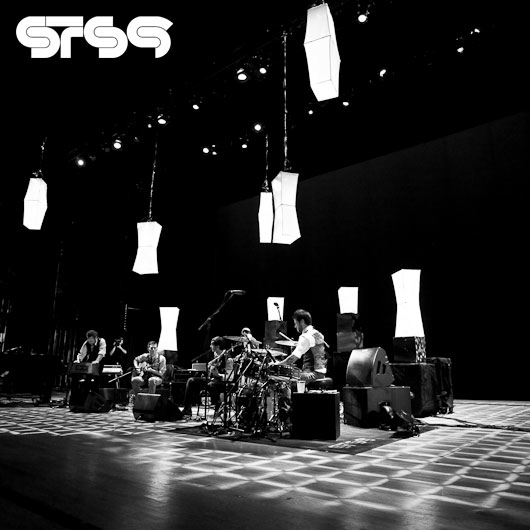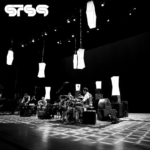
1320 Records
For more then a decade, Sound Tribe Sector 9 has been pushing the limits of instrumental music, in part by incorporating the latest technologies in their performances. Today, an average STS9 show includes a complex tapestry of sound partially derived from traditional instruments, but also featuring laptops, samplers, and numerous other forms of electronic media. But, on one particular night in December of 2009, STS9 chose to axe those cables. What resulted is a massive, almost completely unplugged performance, captured in one of Denver, Colorado’s most lauded opera houses. The subsequent live album – aptly titled Axe The Cables – finds the quintet taking their repertoire through its paces with songs stripped down to their most basic components of melody and rhythm. And those lucky enough to be in attendance that evening made their approval loudly known throughout these two very special sets of STS9.
From the first syncopated moments of opener, “New Soma,” what becomes imminently clear throughout Axe The Cables is that sans electronics does not equal sans energy. But here, energy exists not through the sheer grandeur of sound, rather the subtlety of the emotions behind these acoustic instruments. Far more vulnerable and exposed, these quiet transgressions into the psyche of the band manifest themselves in the form of sensitive scale runs and a keen usage of silence and space. The shimmering sheen of “Re:Stereo,” the deep smoldering amble of “South of Here,” the vast spacial expanses of “Approaching Life,” all dawn far greater meaning and power when freed from the burden of reaching ever higher volumes, and filling every void of silence. In fact, the novelty of hearing many of STS9’s fan favorites, reinvented, remains intact throughout the lengthy album largely because this newly gleaned level of intimacy is so compelling of listener attention.
However, in true STS9 fashion, Axe The Cables features many moments of epic climbs and climactic peaks. On “Equinox,” the quintet attains a particular oneness that, in this acoustic form, takes on a peculiar Dave Brubeck-ish vibe (“Take Five”). Rising and falling together, their infectious riffs interweave into a single unified motion, and its this synergy which usurps the roll of distortions and effects, leading to what amounts to a jazz style jam: cerebral in its structure, but visceral in its experience. Indeed, it’s the different ways in which STS9 explores handling space and energy to attain these peaks that proves one of the albums most attractive qualities. The deliberately slowed pace of “Moonsocket” is at first not entirely recognizable, until the lead guitar riff comes in, its odd angles and acoustic acrobatics worthy of Keller Williams himself. And it’s this sudden realization of what song is being played that causes a rush of energy every bit as exciting as any moment of all out rawk.
What’s special about Axe The Cables is that STS9 proves as thrilling unplugged as they are fully adorned in electronics. And though normally pushing the limits of what can be done with technology, it’s quite refreshing to hear the electronica troupe exploring the other end of the instrumental spectrum, and, rocking it just as good. Not only would STS9 fans find this album essential to their music collection, but fans of acoustic instrumentalists (i.e., Acoustic Alchemy) and jazz listeners in general would likely find that Axe The Cables resonates loudly with their musical tastes. STS9 delivers again, albeit in a wholly new way.



No Comments comments associated with this post